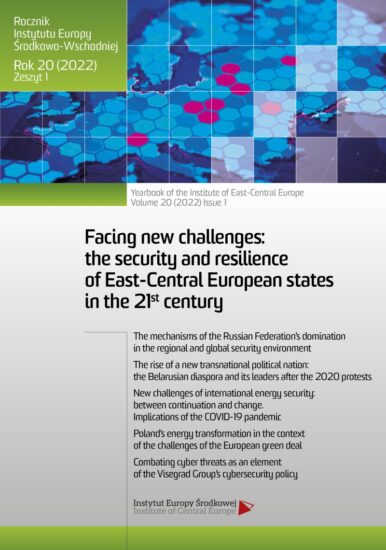Powstanie nowego transnarodowego narodu politycznego: białoruska diaspora i jej liderzy po protestach 2020 roku
ORCID: Kseniya Homel: 0000-0001-6893-780X
Wydanie: Lublin 2022
DOI: https://doi.org/10.36874/RIESW.2022.1.3
Sposób cytowania: M. Jaroszewicz, M. Lesińska, K. Homel, The rise of a new transnational political nation: the Belarusian diaspora and its leaders after the 2020 protests, „Rocznik Instytutu Europy Środkowo-Wschodniej” 20(2022), z. 1, s. 35-56, DOI: https://doi.org/10.36874/RIESW.2022.1.3.
Keywords: Belarus, democratic transformation, diaspora, nationhood
Abstrakt: Kiedy w kraju autorytarnym brakuje możliwości swobodnej działalności politycznej, diaspora i jej przywódcy często przyjmują rolę demokratycznej opozycji przeciwko autorytarnemu rządowi i podejmują działania na rzecz demokratyzacji w kraju pochodzenia. Choć aktywność polityczna za granicą jest dla emigrantów trudna i często ma ograniczony zasięg, to przykład diaspory białoruskiej i jej przywódców pokazuje, że mogą oni z powodzeniem pełnić rolę podmiotu politycznego na arenie międzynarodowej. Prodemokratyczna działalność diaspory białoruskiej koncentruje się na trzech głównych obszarach: kontynuacji oporu przeciwko autorytarnemu reżimowi, rozwoju reprezentacji politycznej oraz wypracowaniu wiarygodnej alternatywy demokratycznej w postaci programu politycznego dla przyszłej demokratycznej Białorusi. Rosyjska agresja na Ukrainę postawiła jednak białoruską opozycję za granicą przed dylematem, czy w nowej sytuacji geopolitycznej zająć radykalne stanowisko narodowowyzwoleńcze.
Bibliografia:
Akudovich V., The code of absence [Код адсутнасці], Minsk 2007.
Bedford S., Vinatier L., Resisting the Irresistible: “Failed Opposition” in Azerbaijan and Belarus Revisited, “Government and Opposition” 2019, vol. 54, no. 4.
Bekus N., Struggle over identity: The official and the alternative “Belarusianness”, Central European University Press 2010.
Bekus N., Echo of 1989? Protest Imaginaries and Identity Dilemmas in Belarus, “Slavic Review” 2021, vol. 80, no. 1.
Boix C., Stokes S., Endogenous democratization, “World Politics” 2003, vol. 55, no. 4.
Brubaker R., The “diaspora” diaspora, “Ethnic and Racial Studies” 2005, vol. 28, no. 1.
Coordination Council, The concept of law reinstatement and national reconciliation, March 2021, https://rada.vision/en/the-concept.
Dahl R., On Democracy: A Citizen’s Guide, New Haven 2000.
Douglas N., Belarus: From the Old Social Contract to New Social Identity, “ZOiS Report” 2020, vol. 6, https://en.zois-berlin.de/file-admin/media/Dateien/3 Publikationen/ZOiS_Reports/2020/ZOiS_Report_6_2020.pdf.
Greene S.A., You are what you read: media, identity, and community in the 2020 Belarusian uprising, “Post-Soviet Affairs” 2022, vol. 38, no. 1-2.
Kazharski A., Belarus’ new political nation? 2020 anti-authoritarian protests as identity building, “New Perspectives” 2021, vol. 29, no. 1.
Kłysiński K., Belarus: formation of Tsikhanouskaya’s interim cabinet, Analyses of OSW Centre for Eastern Studies, 10 August 2022, https://www.osw.waw.pl/en/publikacje/analyses/2022-08-10/belarus-formation-tsikhanouskayas-interim-cabinet.
Koinova M., Diasporas and democratization in the post-communist world, “Communist and Post-Communist Studies” 2009, vol. 42, no. 1.
Kuzio T. Transition in Post-Communist States. Triple or Quadruple?, “Contemporary Politics” 2001, vol. 21, no. 3.
Lahvinets A., Papko A., Unfinished Business. Challenges for Belarus on its Way to Democracy, “European View” 2010, vol. 9, no. 2.
Levitsky S., Way L.A., Competitive Authoritarianism: Hybrid Regimes After the Cold War, Cambridge 2010.
Linz J., Stepan A., Problems of Democratic Transition and Consolidation: Southern Europe, South America and post-Communist Europe, Baltimore 1996.
Linz J.L., Stepan A., Toward Consolidated Democracies, “Journal of Democracy” 1996, vol. 7, no. 2.
National Anti-Crisis Management, March 2022, https://belarus-nau.org/by#rec447619916.
“New Belarus” conference, Draft declaration on the aims and values of the Belarusian democratic forces, Vilnius, 9 August 2022, https://conferencenewbelarus.org/declaracija.
Pérez-Díaz V.M., The Return of Civil Society. The Emergence of Democratic Spain, Cambridge 1993.
Petrova I., Korosteleva E., Societal fragilities and resilience: The emergence of peoplehood in Belarus, “Journal of Eurasian Studies” 2021, vol. 2, no. 2.
Radio Free Liberty Europe, EU does not recognize Lukashenko as Belarusian President, Borell Says, 15 September 2020, https://www.rferl.org/a/eudoes-not-recognize-Lukashenko-borrell-says/30840563.html.
Rudkouski P., Powstawanie Białorusi, Wrocław 2009.
Shchyttsova T., Overcoming authoritarianism: path-dependency and new citizenship, in Overcoming authoritarianism: Belarus and the Eastern European Region 30 years later, “Topos Journal for Philosophy and Cultural Studies” 2021, vol. 2.
Shain Y., The Frontier of Loyalty. Political Exiles in the Age of the Nation-State, University of Michigan Press, 2005.
Sierakowski S., Belarus Uprising: The Making of a Revolution, “Journal of Democracy” 2022, vol. 31, no. 4.
Silitski V., Preempting democracy. The case of Belarus, “Journal of Democracy” 2005, vol. 26, no. 4.
Stepan A., Democratic Opposition and Democratization Theory, “Government and Opposition” 1997, vol. 32, no. 4.
Sviatlana Tsikhanouskaya declared herself as the national leader of Belarus, 24 February 2022, https://tsikhanouskaya.org/en/events/news/ca51ca6ec0f8686.html.
Sviatlana Tsikhanouskaya announced the United Transitional Cabinet and named its first members, 9 August 2022, https://tsikhanouskaya.org/en/events/news/e1e57cee6d4a3a9.html.
White D., Political opposition in Russia: the challenges of mobilisation and the political-civil society nexus, “East European Politics” 2015, vol. 31, no. 3.
Wnuk-Lipiński E., Civil Society and Democratization, [in:] The Oxford Handbook of Political Behavior, R.J. Dalton, H.D. Klingemann (eds.), Oxford 2007.
World Belarus Congress 2020, https://belarusabroad.org/en/world-belarus-congress-2020/.

PDF: Pobierz